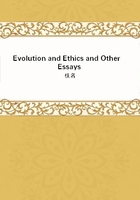
第54章
It is conceivable that, at some. in the history of the fabled Atlantis, the production of food should have been exactly sufficient to meet the wants of the population, that the makers of the commodities of the artificer should have amounted to just the number supportable by the surplus food of the agriculturists. And, as there is no harm in adding another monstrous supposition to the foregoing, let it be imagined that every man, woman, and child was perfectly virtuous, and aimed at the good of all as the highest personal good. In that happy land, the natural man would have been finally put down by the ethical man. There would have been no competition, but the industry of each would have been serviceable to all; nobody being vain and nobody avaricious, there would have been no rivalries; the struggle for existence would have been abolished, and the millennium would have finally set in. But it is obvious that this state of things could have been permanent only with a stationary population. Add ten fresh mouths; and as, by the supposition, there was only exactly enough before, somebody must go on short rations. The Atlantis society might have been a heaven upon earth, the whole nation might have consisted of just men, needing no repentance, and yet somebody must starve. Reckless Istar, non-moral Nature, would have riven the ethical fabric. I was once talking with a very eminent physicianabout the vis medicatrix naturae. "Stuff!" said he; "nine times out of ten nature does not want to cure the man: she wants to put him in his coffin." And Istar-Nature appears to have equally little sympathy with the ends of society. "Stuff! she wants nothing but a fair field and free play for her darling the strongest."
The late Sir W. Gull Our Atlantis may be an impossible figment, but the antagonistic tendencies which the fable adumbrates have existed in every society which was ever established, and, to all appearance, must strive for the victory in all that will be. Historians point to the greed and ambition of rulers, to the reckless turbulence of the ruled, to the debasing effects of wealth and luxury, and to the devastating wars which have formed a great part of the occupation of mankind, as the causes of the decay of states and the foundering of old civilizations, and thereby point their story with a moral. No doubt immoral motives of all sorts have figured largely among the minor causes of these events. But beneath all this superficial turmoil lay the deep-seated impulse given by unlimited multiplication. In the swarms of colonies thrown out by Phoenicia and by old Greece; in the ver sacrum of the Latin races; in the floods of Gauls and of Teutons which burst over the frontiers of the old civilization of Europe; in the swaying to and fro of the vast Mongolian hordes in late times, the population problem comes to the front in a very visible shape. Nor is it less plainly manifest in the everlasting agrarian questions of ancient Rome than in the Arreoi societies of the Polynesian Islands.
In the ancient world, and in a large part of that in which we live, the practice of infanticide was, or is, a regular and legal custom; famine, pestilence, and war were and are normal factors in the struggle for existence, and they have served, in a gross and brutal fashion, to mitigate the intensity of the effects of its chief cause.
But, in the more advanced civilizations, the progress of private and public morality has steadily tended to remove all these checks. We declare infanticide murder, and punish it as such; we decree, not quite so successfully, that no one shall die of hunger; we regard death from preventible causes of other kinds as a sort of constructive murder, and eliminate pestilence to the best of our ability; we declaim against the curse of war, and the wickedness of the military spirit, and we are never weary of dilating on the blessedness of peace and the innocent beneficence of Industry. In their moments of expansion, even statesmen and men of business go thus far. The finer spirits look to an ideal civitas Dei; a state when, every man having reached the point of absolute self-negation, and having nothing but moral perfection to strive after, peace will truly reign, not merely among nations, but among men, and the struggle for existence will be at an end.
Whether human nature is competent, under any circumstances, to reach, or even seriously advance towards, this ideal condition, is a question which need not be discussed. It will be admitted that mankind has not yet reached this stage by a very long way, and my business is with the present. And that which I wish to point out is that, so long as the natural man increases and multiplies without restraint, so long will peace and industry not only permit, but they will necessitate, a struggle for existence as sharp as any that ever went on under the regime of war. If Istar is to reign on the one hand, she will demand her human sacrifices on the other.
Let us look at home. For seventy years peace and industry have had their way among us with less interruption and under more favourable conditions than in any other country on the face of the earth. The wealth of Croesus was nothing to that which we have accumulated, and our prosperity has filled the world with envy. But Nemesis did not forget Croesus: has she forgotten us?
I think not. There are now 36,000,000 of people in our islands, and every year considerably more than 300,000 are added to our numbers.